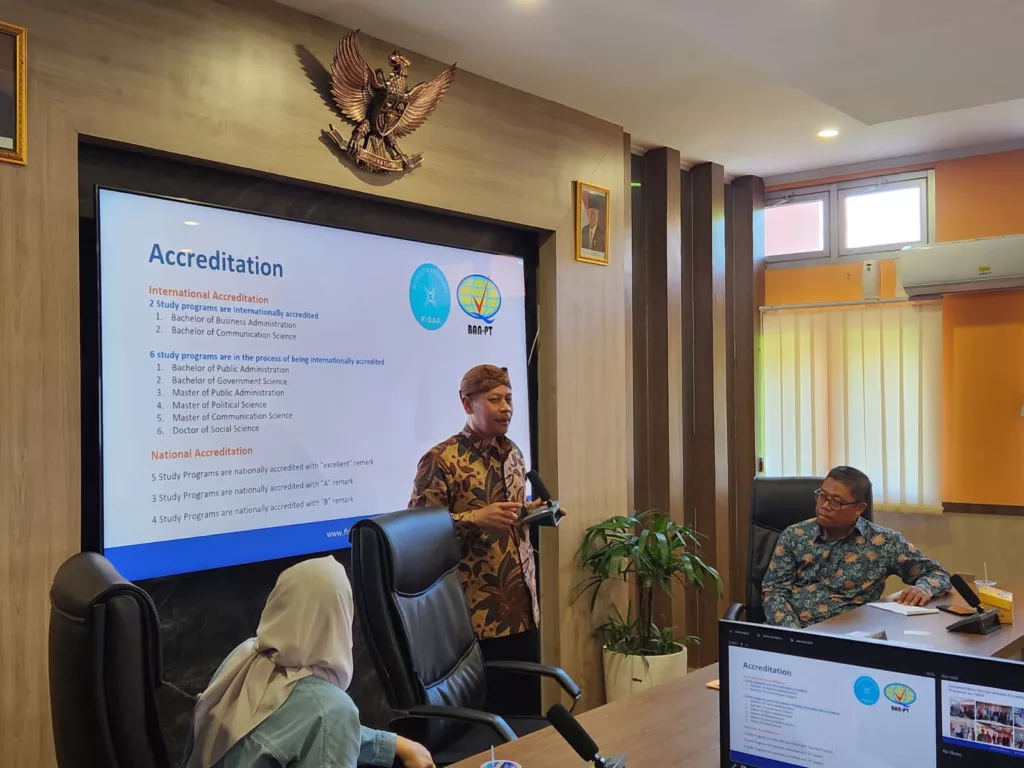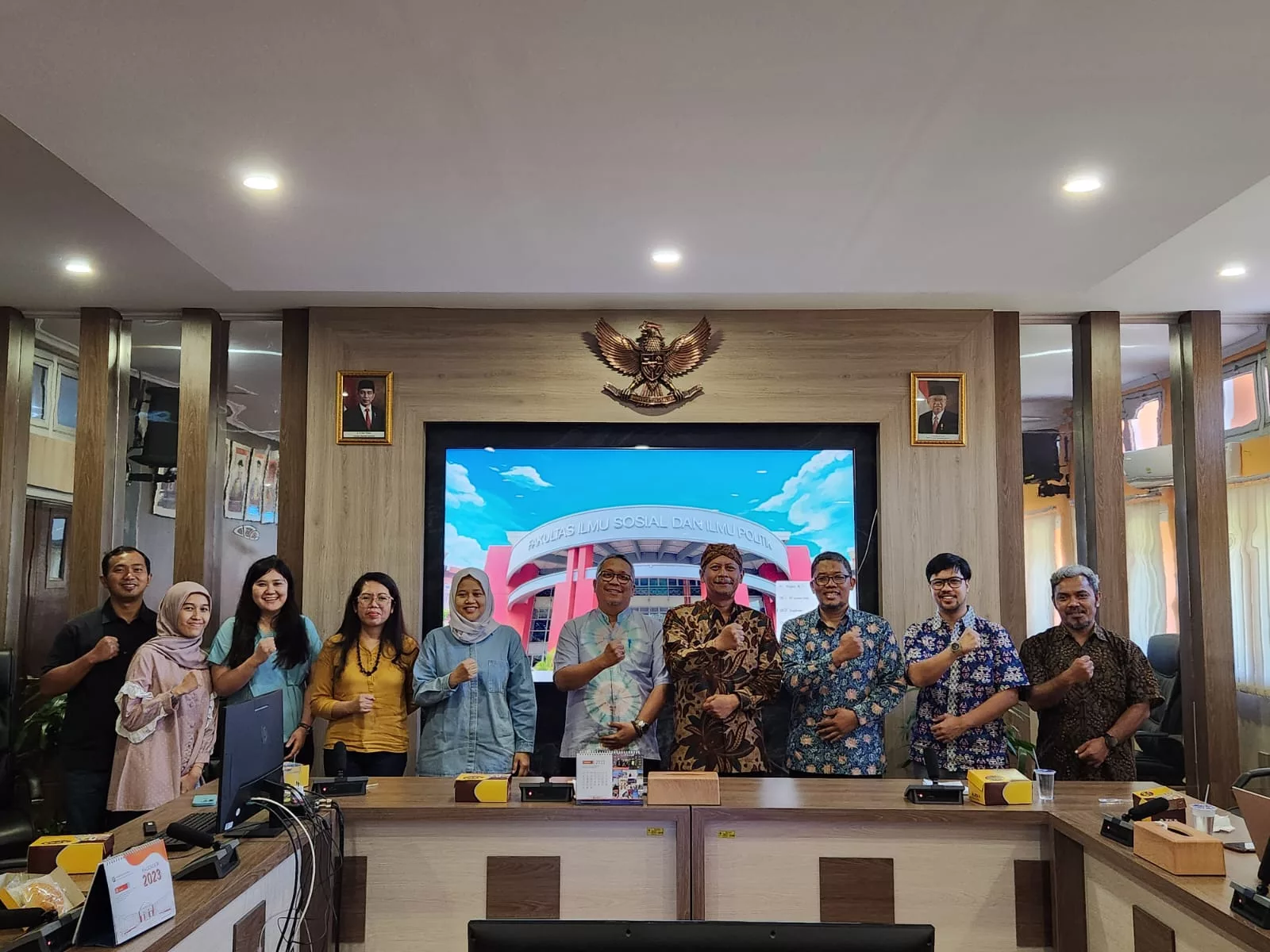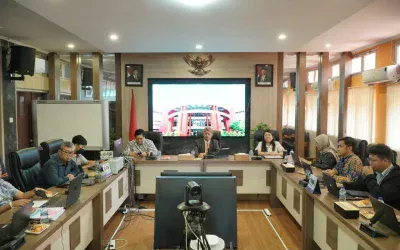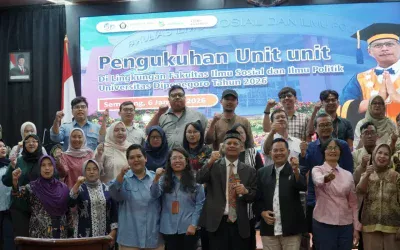Semarang (11/12) – The Department of Communication Science, Faculty of Social and Political Sciences (FISIP) at Universitas Diponegoro (UNDIP) welcomed an academic visit from the Department of Development Studies, Faculty of Creative Design and Digital Business at the Sepuluh Nopember Institute of Technology (ITS). The event held in the Senate Meeting Room of FISIP Undip served as a significant moment for the Department of Development Studies, ITS to delve deeper into the management of the Communication Science study program, which stands as one of UNDIP’s flagship programs.
The event was officially opened by Dr. Teguh Yuwono, M.Pol.Admin, the Vice Dean for Academic and Student Affairs at FISIP Undip. Dr. Teguh welcomed and conveyed the achievements that the Department of Communication Science had obtained thus far. At 10:00 AM, the meeting commenced with the presence of key figures, including the Chairperson of the Department of Communication Science, the Heads of the Communication Science undergraduate and postgraduate programs, and several lecturers representing the Department of Communication Science at UNDIP. Meanwhile, the Department of Development Studies at ITS was represented by Hermanto, SS., M.Pd., Aurelius Ratu, SS, M.Hum., and Banu Prasetyo, S.Fil., M.Phil., who are experienced lecturers from the institution.

The purpose of this academic visit was to broaden the understanding of the Department of Development Studies, ITS regarding the Communication Science curriculum and the Work-Learn Internship Program for Students (Magang Belajar Kerja Mahasiswa – MBKM) implemented in the Communication Science study program at FISIP Undip. Moreover, the meeting aimed to explore opportunities for collaboration between these two higher education institutions while understanding how graduates from UNDIP’s Communication Science program can be absorbed into an increasingly competitive job market.
The meeting involved presentations on the experiences of the Department of Communication Science at FISIP Undip in contributing to the educational sphere, aimed at providing valuable insights for the Department of Development Studies at ITS for their future institutional development.
Rouli Manalu, PhD, the Head of the Communication Science undergraduate program, expressed support and provided input for establishing the Communication Science program at ITS. She stated, “Certainly, with the resources that ITS possesses, they can be utilized to impart distinctive skills that characterize Communication at ITS, such as in Data Science, Big Data, which can aid in providing insights, for instance, in Marketing Communication.” This sentiment was echoed by the Head of the Communication Science postgraduate program, Dr. Yanuar Luqman, “Especially being in the environment of the Faculty of Creative Design and Digital Business, the Digital aspect or Technology, in general, can undoubtedly become the strength of Communication at ITS. This will, in turn, support its accreditation.”
Dr. Turnomo Rahardjo, a lecturer and Quality Assurance Team member for the Master of Communication Science program, FISIP, also expressed his attention to this matter, stating, “From our experience as accreditation assessors, the insights provided by the administrators earlier will greatly assist ITS in managing the programs it will establish.” Dr. Turnomo, commonly known as Mas Hardjo, is an experienced assessor who has evaluated Communication Science programs at various universities in Indonesia. “And certainly, this distinctive characteristic should be easily envisaged, considering that ITS’s technological resources are deeply rooted.”
Meanwhile, representatives from ITS conveyed their intention to preserve the ‘Social Science’ aspect of the study program they would establish, primarily because it was situated within a campus dominated by Science and Technology programs. This was clarified by the Head of the Department of Communication Science at FISIP Undip, “It’s not that the digital or technological capabilities will dominate the Communication program, but these will become skills that equip students in practising the ‘Social Sciences’ they have learned,” said Dr. Nurul Hasfi. Furthermore, she reinforced this by providing relevant examples in the development of social sciences, particularly in conducting research, “For instance, in Netnography, when students not only observe what happens in, for instance, social media but also scrape data from there and subsequently analyze it. So, it’s not about replacement but an added value from those capabilities.”
The discussion concluded with a campus tour conducted by the delegation, accompanied by representatives from the Department of Communication Science of FISIP Undip. One highlighted location was the Multimedia Laboratory. Assisted by the multimedia laboratory technician from FISIP, Iqbal Setyaji, S.Tr.Sn, the department administrators demonstrated the operation of several facilities available in the Multimedia Laboratory. As a form of enthusiasm from ITS, the delegates requested to take a group photo in some of the studio settings. Through the meeting that day, the Department of Communication Science at FISIP Undip overall hoped for not only reaching the level of a benchmark study but also envisaged various collaborations that could be undertaken with Communication Science at ITS, such as the Merdeka Student Exchange (Pertukaran Mahasiswa Merdeka – PMM).





0 Comments